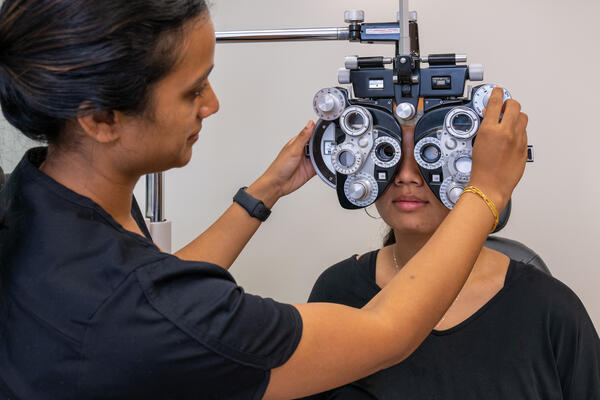Navigating the Maze of Refractive Surgeries: Which Procedure Is Right for You?
In the world of refractive surgical procedures intended at correcting vision, the selection of readily available treatments can usually appear like a labyrinth, each promising to use clearness and accuracy. As people consider beginning on the journey in the direction of more clear vision, the important concern arises: which procedure is undoubtedly the most suitable choice?
Recognizing Refractive Surgical Procedure Options

Elements to Consider Prior To Selecting
Choosing one of the most ideal refractive surgical treatment needs a comprehensive examination of various variables to guarantee ideal end results for each individual. Before picking a procedure, several crucial factors to consider ought to be taken into account. The patient's total eye wellness and particular vision improvement needs play a critical duty. Factors such as the extent of refractive error, corneal thickness, pupil size, and presence of any kind of eye problems need to be thoroughly evaluated by a qualified eye doctor. In addition, the stability of the individual's vision prescription gradually is necessary to figure out the relevance of surgical treatment.
Clients with active way of livings or particular work demands may profit more from certain procedures. People included in get in touch with sports may decide for procedures like PRK over LASIK due to the lowered danger of flap issues.
Contrasting Popular Vision Correction Procedures
Considering the numerous factors that influence the choice of a refractive surgical treatment, it is essential to compare popular vision modification procedures to identify the most appropriate choice for specific requirements. 2 widely known treatments are LASIK (Laser-Assisted in Situ Keratomileusis) and PRK (Photorefractive Keratectomy)
LASIK involves developing a slim flap on the cornea, reshaping the underlying cells with a laser, and after that repositioning the flap. It offers fast recovery and very little pain, with most patients experiencing boosted vision nearly promptly. On the various other hand, PRK includes removing the outer layer of the cornea prior to reshaping it with a laser. Although the healing duration is much longer compared to LASIK, PRK is a better choice for individuals with thin corneas or specific corneal irregularities. eye center andalusia.
When comparing these procedures, elements like corneal density, eye wellness, and wanted recovery time need to be carefully taken into consideration. Consulting with an experienced ophthalmologist is necessary to determine the most suitable procedure based on a person's specific needs and eye health and wellness condition.
Personalized Treatments for Private Demands
Customizing refractive surgical procedures to satisfy special client needs is crucial in achieving optimal aesthetic end results and contentment prices. Personalized treatments consider specific variables such as prescription toughness, corneal density, student size, and way of living factors to consider to figure out the most ideal procedure for each and every person. Advanced modern technologies like wavefront-optimized Web Site or wavefront-guided treatments enable surgeons to resolve higher-order aberrations and improve visual high quality beyond what traditional treatments can provide.

Finding the Right Surgeon for You
When looking for a doctor for refractive surgical treatment, it is my website essential to prioritize know-how and experience in the field. The surgeon you choose will certainly play a considerable duty in the success of your treatment and the result of your vision. To find the appropriate specialist for you, consider variables such as their certifications, specialization in refractive surgical procedures, and the variety of procedures they have done.
Begin by looking into prospective doctors and their qualifications. Look for eye doctors who are board-certified and have specific training in refractive surgical procedure. Additionally, testimonial client endorsements and before-and-after pictures to determine the cosmetic surgeon's performance history of successful end results.
During consultations, inquire about the surgeon's experience with the details procedure you are thinking about. Inquire concerning their complication prices, success prices, and just how they deal with any kind of potential dangers connected with the surgery. A skilled and proficient specialist will certainly not only have the technical experience but also the capacity to customize the treatment to your individual needs, making sure visit this site the best possible results for your vision adjustment trip.
Conclusion
In conclusion, when taking into consideration refractive surgical procedures, it is important to recognize the offered choices, elements to consider, and the distinctions in between prominent procedures. Discovering a knowledgeable doctor that can direct you through the puzzle of options is critical in guaranteeing a successful vision correction treatment.
In the world of refractive surgeries intended at correcting vision, the selection of readily available procedures can usually seem like a maze, each guaranteeing to supply clearness and accuracy. One common treatment is LASIK (Laser-Assisted in Situ Keratomileusis), where a laser reshapes the cornea to deal with refractive mistakes such as astigmatism, nearsightedness, and farsightedness. Customized treatments take right into account specific aspects such as prescription strength, corneal thickness, student size, and lifestyle factors to consider to identify the most ideal procedure for each client. To locate the right surgeon for you, think about variables such as their qualifications, expertise in refractive surgical treatments, and the number of treatments they have actually performed.
In final thought, when taking into consideration refractive surgical procedures, it is vital to recognize the readily available choices, variables to consider, and the differences between popular procedures. - eye center andalusia